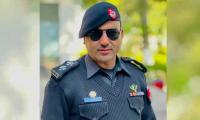The Sindh High Court (SHC) on Monday issued notices to the provincial home department and others on a petition seeking enforcement of the witness protection law.
Petitioner M. Tariq Mansoor submitted in the petition that the Sindh Witness Protection Act was promulgated in 2013 but since then, no serious efforts were made by the provincial government for enforcement of the law.
He submitted that the provincial government did not take steps for the implementation of the Act such as initiation of the witness protection programme, formation of the witness protection board, establishment of a centralised witness protection unit in the home department and appointment of chief witness protection officers.
The petitioner submitted that the federal government had also issued a national action plan in 2014 under which various decision were taken including revamping and reforming the criminal justice system.
He submitted that Pakistan was the country worst affected by terrorism but no measures had been taken to deal with the criminal proceedings of terrorism suspects. The high court was requested to direct the home department to establish the witness protection programme, witness protection advisory board and witness protection unit, and appoint witness protection officers.
The petitioner also requested the SHC to direct the provincial government to frame rules for the Sindh Witness Protection Act. A division bench of the SHC headed by acting chief Justice Irfan Saadat Khan after a preliminary hearing of the petition issued notices to the home department and others and called their comments on the next hearing.
Under the witness protection programme, the provincial government was required to constitute witness protection units for protection and safety of witnesses, allow them to conceal their identity, provide accommodation and reasonable financial assistance to them for obtaining a means of livelihood, and give compensation to their legal heirs if a protected person was killed due to his participation in the programme.
Two acquitted
The SHC on Monday set aside life imprisonment of two persons in a sectarian killing case observing that the prosecution had failed to prove charges on them.
Syed Abu Turab and Faisal Mehmood had been sentenced to life imprisonment by an anti-terrorism court for murdering a madrasa student, Hasan, and injuring his relative in the Gulshan-e-Iqbal area on April 1, 2014.
According to the prosecution, the appellants had fired at the student while he was returning from the Madrasa Ahsanuloom to his home situated in Gulshan-e-Iqbal area, and fled. As a result of the firing, Hasan died and his cousin Saad sustained injuries.
A counsel for the appellants submitted that the prosecution witness did not describe features in their police statements and their identification before the magistrate could not be relied upon. They submitted that there were material contradictions in the evidence of the prosecution witnesses and the benefit of the doubt should be extended to the appellants.
An additional prosecutor general supported the trial court order and submitted that eyewitnesses had identified the appellants while committing offence and requested the court to dismiss the appeals. A division bench of the high court comprising Justice Mohammad Karim Khan Agha and Justice Amjad Ali Bohio after hearing the arguments and perusal of the evidence observed that the complainant’s description of the appellant was vague although he was the prime witness of the case.
The high court observed that the investigation officer conducted the identification parade for the appellants 14 days after their arrest through another eyewitness Liaquat instead of the injured eyewitness Saad and did not provide explanation for such deviation.
The bench observed that the identification parade of the appellants was not made as per the law and the witnesses did not provide sufficient description of the appellants at the time of recording their statements, due to which their testimonies could not be relied upon to convict the appellants.
The SHC observed that the record of the case showed that the prosecution’s case was full of legal infirmities which had been overlooked by the trial court. Besides, the judicial magistrate had also deposed that witnesses did not disclose the specific role of the appellants at the time of the identification parade.
The bench observed that the prosecution had failed to prove charges on the appellants and set aside their conviction. It ordered their release if they were not required in other cases.
Commuters make their way through a partially deserted bridge in Karachi. — AFP/FileNauTarangT2F, in collaboration...
World-renowned guitarist Thibault Cauvin during a performance on April 20, 2024. — Facebook/Alliance française de...
This representational image shows the hands of an incarcerated person. — AFP/FilePolice on Thursday claimed to have...
A representational image of a police tape wrapped on a tree at a crime scene. — AFP/FileA man was gunned down near...
The sui gas meters can be seen in this picture. — APP FileIn a relentless effort to control the menace of gas theft,...
Removes illegal encroachment during anti encroachment drive under the supervision of Karachi Municipal Corporation ...







